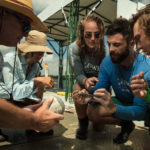UWF Masters of Social Work program granted accreditation
After starting its first class less than three years ago in January 2009, the UWF Masters of Social Work (MSW) program has been granted initial accreditation from the Council on Social Work Education. This significant accomplishment was achieved under the leadership of Glenn Rohrer, director of the School of Justice Studies and Social Work. Rohrer joined UWF in 2006 to start the MSW program after working at East Carolina University for 17 years where he holds the title of professor emeritus.
After starting its first class less than three years ago in January 2009, the UWF Masters of Social Work (MSW) program has been granted initial accreditation from the Council on Social Work Education. This significant accomplishment was achieved under the leadership of Glenn Rohrer, director of the School of Justice Studies and Social Work. Rohrer joined UWF in 2006 to start the MSW program after working at East Carolina University for 17 years where he holds the title of professor emeritus.
“The key to any academic program is accreditation,” says Rohrer, “and the very first thing I did was to contact the state licensure board and tell them we were starting this program. That ensured that the 53 students in our first graduating class would be included in our accreditation, and that they could start the licensing process right away.”
While the B.A. degree program in Social Work at UWF has been continuously accredited since 1974, this new accreditation of the MSW makes UWF one of only about 200 universities with a nationally accredited master’s program.
According to Rohrer, “Graduation from an accredited institution is the gold standard in the profession, and our program opens many doors for our students.”
State licensure laws are now in effect in all 50 states for social workers, and UWF graduates from the first MSW class are now working not only in Florida, but also in Alabama, North Carolina, Montana and even Hawaii.
Many of the 100-plus students currently in the program are from Pensacola and the surrounding areas of Escambia County, but there are students from Okaloosa, Mobile and Baldwin counties as well. Because of this geographically diverse student body, Rohrer anticipates the program moving toward a more blended structure, with an increased number of online classes and fewer face-to-face meetings at the Pensacola campus.
The program requires a lot of hands-on experience: 900 hours of field education are required in the regular program and 600 hours in the Advanced Standing program for students who already hold a B.A. in social work and advanced credentials. The program has written agreements with over 100 agencies in the surrounding areas.
“One thing that is quite different about our program are the weekly Field Education Seminars,” says Rohrer. “Students sit down with a licensed clinical social worker from our faculty and talk about what they are doing in hospitals, prisons, youth-serving agencies, the VA, or where ever they are placed. That way there is some cross-fertilization in the field experience; they learn about not just one area of practice but many.”
Rohrer attributes the program’s successful bid for accreditation in part to the wide and varied experience of the UWF faculty. “Most of our faculty are experienced social workers themselves, and teach from that experience. They help our students to apply the theories they learn and put it all into practice.”
For more info on the Masters of Social Work and other programs available through the College of Professional Studies, visit uwf.edu/cops.


